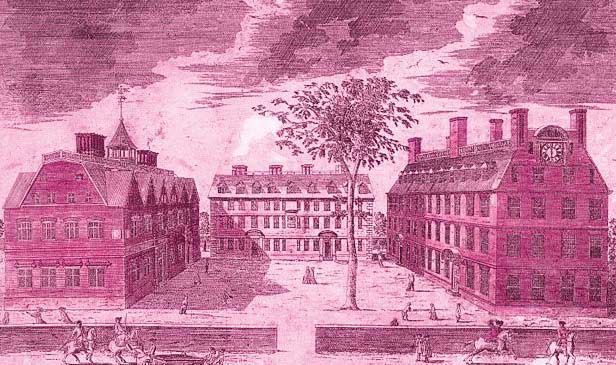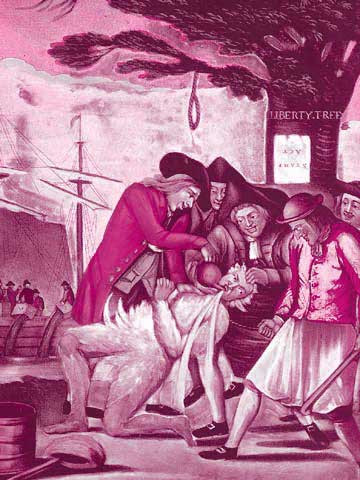




印花税条例
|

|
英国在取得对法国的“七年战争”胜利后,为转嫁战争军费负担,掠夺殖民地的各种资源,加强了对北美殖民地的控制与压榨。1765年3月22日,英国议会又通过了《印花税法》。为反对《印花税法》的施行,许多殖民地居民成立秘密组织,开展反印花税斗争,提出了“要自由、财产,不要印花税”的口号。

|
Reading in a single sitting
|
The British victory in the Seven Years' War (1756-1763), known in British America as the French and Indian War, had been won only at a great financial cost. During the war, the British national debt nearly doubled. Post-war expenses were expected to remain high because the Bute ministry decided in early 1763 to keep ten thousand British regular soldiers in the American colonies, which would cost about 225, 000 per year. The primary reason for retaining such a large force was that demobilizing the army would put 1, 500 officers, many of whom were well-connected in Parliament, out of work. This made it politically prudent to retain a large peacetime establishment, but because Britons were averse to maintaining a standing army at home, it was necessary to garrison the troops elsewhere.
Stationing most of the army in North America made strategic sense because Great Britain had acquired the vast territory of New France in the 1763 peace treaty, and troops would be needed to maintain control of the new empire. The outbreak in May 1763 of Pontiac' s Rebellion(庞蒂亚克的叛乱), an American Indian uprising against Anglo-American occupation and expansion, reinforced the logic of this decision. Some older accounts claimed that Pontiac' s Rebellion prompted the decision to garrison 10, 000 troops in North America, but the Bute ministry had already made the decision before Pontiac' s uprising.

The Stamp Act of 1765 was a direct tax imposed by the British Parliament specifically on the colonies of British America. The act required that many printed materials in the colonies be produced on stamped paper produced in London and carrying an embossed revenue stamp. These printed materials were legal documents, magazines, newspapers and many other types of paper used throughout the colonies. Like previous taxes, the stamp tax had to be paid in valid British currency, not in colonial paper money. The purpose of the tax was to help pay for troops stationed in North America after the British victory in the Seven Years' War. The British government felt that the colonies were the primary beneficiaries of this military presence, and should pay at least a portion of the expense.
The Stamp Act met great resistance in the colonies. The colonies sent no representatives to Parliament, and therefore had no influence over what taxes were raised, how they were levied , or how they would be spent. Many colonists considered it a violation of their rights as Englishmen to be taxed without their consent-consent that only the colonial legislatures could grant. Colonial assemblies sent petitions and protests. The Stamp Act Congress held in New York City, reflecting the first significant joint colonial response to any British measure, also petitioned Parliament and the King. Local protest groups, led by colonial merchants and landowners, established connections through correspondence that created a loose coalition that extended from New England to Georgia. Protests and demonstrations initiated by the Sons of Liberty often turned violent and destructive as the masses became involved. Very soon all stamp tax distributors were intimidated into resigning their commissions, and the tax was never effectively collected.
Opposition to the Stamp Act was not limited to the colonies. British merchants and manufacturers, whose exports to the colonies were threatened by colonial economic problems exacerbated by the tax, also pressured Parliament. The Act was repealed on March 18, 1766 as a matter of expedience, but Parliament affirmed its power to legislate for the colonies "in all cases whatsoever" by also passing the Declaratory Act. This incident increased the colonists' concerns about the intent of the British Parliament that helped the growing movement which later became the American Revolution.
经英国议会批准后的《印花税法》规定:“殖民地的报纸、年历、小册子、证书、商业单据、债券、广告、租约、法律文件以至结婚证书等,都必须贴上票面为半便士至20先令的印花税票(须用硬币购买),违者将被送到不设陪审团的海事法庭受审。”对于这项《印花税法》,殖民地居民怨声载道,他们认为各殖民地的权利是直接来自英王的特许而不是来自英国的议会,英国的国会里没有一个殖民地的议员代表,因此根本没有通过对殖民地加征税收的法案的权力。“无代表不纳税”成为当地居民反对课税的基本理由。
纽约、费城、波士顿的商人们决定联合起来,提出如果不废除《印花税法》,就拒绝销售英国的货物。殖民地当地的妇女们也组织起名叫“自由之女”的团体,她们自己纺纱织布,不穿从英国进口的纺织品,提出了“宁穿土布衣,决不失自由”的鲜明口号。
retain 保留
demobilize 遣散,使退伍
prudent 谨慎的
garrison 驻防
uprising 起义
valid 有效的
portion 部分
resistance
levy 征收
petition 请愿
demonstration 示威游行
exacerbate 加剧,恶化

|
Background Knowledge
|
The Seven Years' War was a global military conflict between 1756 and 1763, involving most of the great powers of the time affecting North and Central America, Europe, the West African coast, India and the Philippines.
The war was driven by the antagonism between Great Britain and the Bourbons (in France and Spain), resulting from overlapping interests in their colonial and trade empires and by the antagonism between the Hohenzollerns (in Prussia) and Habsburgs, resulting from territorial and hegemonial conflicts in the Holy Roman Empire. The diplomatic revolution established an Anglo-Prussian camp, allied with some smaller German states and later Portugal, as well as an Austro-French camp, allied with Sweden, Saxony and later Spain. The Russian Empire left its offensive alliance with the Habsburgs on the succession of Peter III, and like Sweden concluded a separate peace with Prussia in 1762. The war ended with the peace treaties of Paris and of Hubertusburg in 1763. The war was characterized by sieges and arson of towns as well as open battles involving extremely heavy losses: overall, some 900, 000 to 1, 400, 000 people died.
Pontiac' s War or Pontiac' s Rebellion was a war that was launched in 1763 by a loose confederation of elements of Native American tribes primarily from the Great Lakes region, the Illinois Country, and Ohio Country who were dissatisfied with British postwar policies in the Great Lakes region after the British victory in the French and Indian War (1754-1763). Warriors from numerous tribes joined the uprising in an effort to drive British soldiers and settlers out of the region. The war is named after the Ottawa leader Pontiac, the most prominent of many native leaders in the conflict.

Warfare on the North American frontier was brutal, and the killing of prisoners, the targeting of civilians and other atrocities were widespread. In what is now perhaps the best-known incident of the war, British officers at Fort Pitt attempted to infect the besieging Native Americans with smallpox using blankets that had been exposed to the virus. The ruthlessness and treachery of the conflict was a reflection of a growing divide between the separate populations of the British colonists and Native Americans.
The Daughters of Liberty was a successful Colonial American group that consisted of women who displayed their patriotism by participating in boycotts of British goods following the passage of the Townshend Acts. Using their feminine skills of the time, they made homespun cloth and other goods.
The Daughters of Liberty used their traditional skills to weave yarn and wool into fabric, known as "homespun". They were recognized as patriotic heroines for their success, making America less dependent on British textiles. Proving their commitment to "the cause of liberty and industry", they openly opposed the Tea Act. They experimented to find substitutes for taxed goods such as tea and sugar. Discoveries like boiled basil leaves to make a tea like drink helped lift spirits as well as allowed for kept traditions without the use of British taxed tea.

|
Background Knowledge
|
七年战争胜利后,英国在北美的政策进一步激化了英国政府与北美殖民地居民的矛盾。
英国政府为偿还巨额的战争债务和扶植英国本土迅猛发展的制造业,进一步加紧了对北美殖民地的控制,它既垄断了北美洲的商业,又控制着北美洲的运输,并对北美殖民地的糖、咖啡、纺织品等商品加征苛刻的进口关税,强迫殖民地居民负责当地英国军队的住房与给养。英国殖民当局的上述政策受到殖民地居民的强烈反对。
1765年3月22日,英国议会又通过了《印花税法》。一些思想比较激进的人士为阻止《印花税法》生效,举行游行示威,高呼“要自由,不要印花税”,捣毁税局,放火焚毁成堆的税票,迫使税吏辞职,有些地方甚至发生了暴乱。在波士顿,一群反《印花税法》的人冲进当地一位名叫安德鲁·奥利弗的印花税票代销人家里,威胁着要杀了他。次日,这位代销人别无选择地被迫辞职了,其他印花税票代销人也都纷纷挂职而去。在纽约,副总督科尔登在一群反《印花税法》人的冲击下逃到英国军舰上寻求保护,这群人随即袭击了伯特利要塞,冲击了总督的马车房,焚毁了印花税票,随后来到一位曾威胁要把《印花税法》从人们的喉咙里塞下去的守备军官家里,砸烂了他的家具与摆设,铲平了他的花园。
1765年11月1日原本应该是《印花税法》正式生效的日子,可是当这一天到来的时候,殖民地已找不到一张印花税票,更找不出一个人来代销印花税票——《印花税法》在殖民地居民的强烈反对下彻底流产,报纸不贴印花税票照样发行,商人在没有交税的情况下继续贸易。10月7日到25日,9个殖民地派出29位代表在纽约召开反印花税会议,目的在于协调统一各殖民地的政治立场,它成为后来大陆会议的预演。10月19日,会议通过了《权利和公平宣言》,在表示对英国议会“一切应有的服从”之后,提出北美的居民与英国本土的人们一样有着天赋的权利和自由,未经本人或代表的同意不得向他们加征任何税收,征税唯一的合法机构只能是殖民地议会而非英国议会。